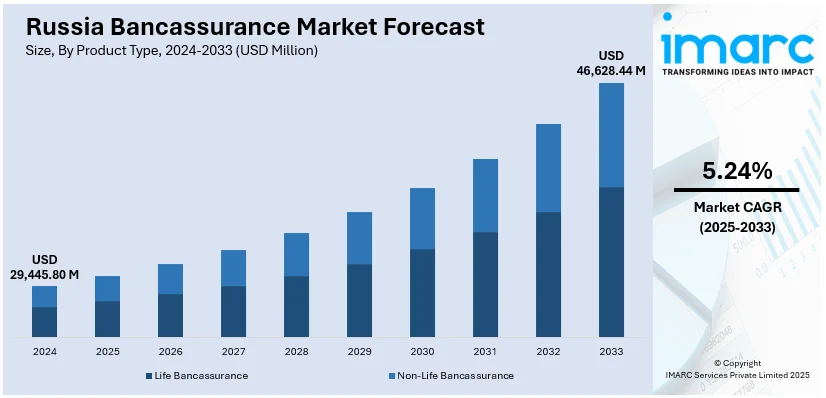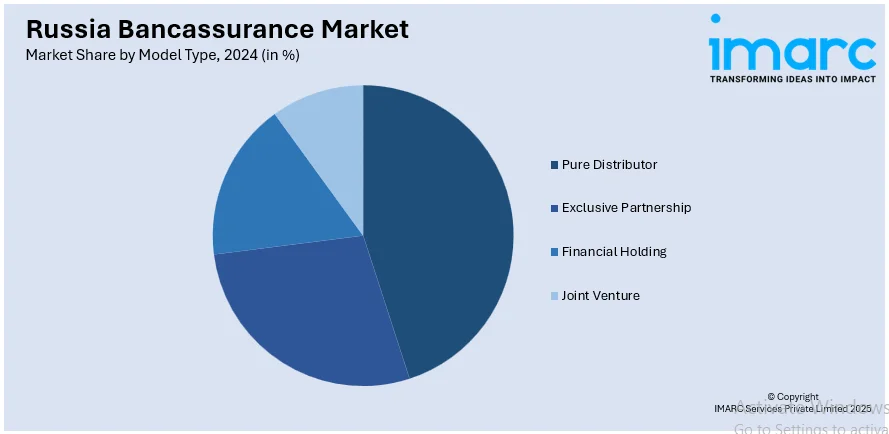
Russia Bancassurance Market Size, Share, Trends and Forecast by Product Type, Model Type, and Region, 2025-2033
Russia Bancassurance Market Overview:
The Russia bancassurance market size reached USD 29,445.80 Million in 2024. Looking forward, the market is projected to reach USD 46,628.44 Million by 2033, exhibiting a growth rate (CAGR) of 5.24% during 2025-2033. The market is driven by stringent supervisory standards, large bank distribution footprints, and disciplined product governance that elevates insurance from add-on to core financial planning. Household demand is amplified by credit-linked protection, property cover tied to mortgages, and growing interest in voluntary health plans, with banks leveraging payroll and SME relationships for group solutions, further augmenting the Russia bancassurance market share.
|
Report Attribute
|
Key Statistics
|
|---|---|
|
Base Year
|
2024
|
|
Forecast Years
|
2025-2033
|
|
Historical Years
|
2019-2024
|
| Market Size in 2024 | USD 29,445.80 Million |
| Market Forecast in 2033 | USD 46,628.44 Million |
| Market Growth Rate 2025-2033 | 5.24% |
Russia Bancassurance Market Trends:
Regulatory Structure, Bank Scale, and Product Governance
Russia’s bancassurance channel operates under a consolidated supervisory regime led by the Bank of Russia, which has tightened conduct standards, disclosure rules, and suitability assessments for retail insurance sold through banks. Large universal banks command extensive reach across regions, which enables deep integration of insurance into everyday financial journeys such as account onboarding, mortgage origination, and consumer lending. Partnerships between banks and life insurers have evolved toward clearer product governance, transparent pricing, and cooling-off provisions, reducing mis-selling risks and improving persistency. In August 2025, Sberbank Life Insurance announced the launch of Russia’s first shared life insurance program, “Equity Capital,” with a projected annual return of 20.2% under a neutral market scenario. The fund’s portfolio will be split evenly between bonds and money market instruments, with management fees set at 0.9% per year and additional expenses capped at 0.33%, making it one of the lowest-cost offerings in the region. Branch networks and contact centers remain influential, yet they increasingly coordinate with centralized underwriting and analytics teams to align advice with risk profiles and affordability thresholds. The combination of scale, compliance discipline, and embedded processes has elevated insurance from an ancillary add-on to a structured component of household financial planning. As banks standardize scripts, strengthen agent accreditation, and align incentives with long-term value rather than one-off commissions, conversion quality and customer retention improve across life, health, and property lines, reinforcing Russia bancassurance market growth.

To get more information on this market, Request Sample
Household Protection Demand, Credit-Linked Policies, and Health Benefits
Household demand is supported by a stable savings culture, rising use of mortgages and consumer loans, and growing awareness of financial protection. Credit-linked products, including mortgage life, accident, and critical illness cover, are frequently bundled at the point of loan sale to protect borrowers and lenders against income shocks. Property insurance tied to mortgages strengthens bank collateral and appeals to customers seeking seamless documentation and pricing. Voluntary health insurance is gaining relevance as families look for faster access to diagnostics, private clinics, and specialist care, and banks position curated health plans as part of premium account tiers. Endowment and unit-linked policies distributed through relationship managers cater to long-term goals such as education funding and retirement supplementation. Corporate payroll relationships also matter, allowing banks to promote group accident and medical riders to SMEs and mid-market firms. Consistent renewal workflows, loyalty pricing, and simple claims pathways underpin persistency. Together, these dynamics connect everyday banking with tangible protection outcomes, broadening adoption beyond metropolitan centers and embedding insurance within routine financial behavior.
Digital Ecosystems, Remote Onboarding, and Data-Driven Personalization
Russia’s leading banks operate multi-service digital ecosystems that integrate payments, e-commerce, lifestyle services, and wealth tools, which creates high-frequency engagement for insurance discovery and servicing. Remote KYC and biometric identification allow instant issuance of simple life, accident, and travel policies within mobile apps. API-based connectivity between bank cores and insurer systems supports pre-filled forms, real-time underwriting, and instant premium collection, reducing friction at checkout. Data models draw on transaction history, credit behavior, and channel preferences to present context-aware offers such as income protection during loan top-ups or property cover at mortgage renewal. Chatbots, secure messaging, and video consultations provide advice at scale while routing complex needs to licensed advisors. Claims submission through app uploads and status tracking improves transparency and net promoter scores. Importantly, banks map customer journeys end-to-end, linking protection to savings goals, health benefits, and loyalty programs, which strengthens cross-sell economics. This digital orchestration expands reach across Russia’s vast geography and enhances lifetime value through timely, personalized, and compliant insurance interactions.
Russia Bancassurance Market Segmentation:
IMARC Group provides an analysis of the key trends in each segment of the market, along with forecasts at the country and regional levels for 2025-2033. Our report has categorized the market based on product type and model type.
Product Type Insights:
- Life Bancassurance
- Non-Life Bancassurance
The report has provided a detailed breakup and analysis of the market based on the product type. This includes life bancassurance and non-life bancassurance.
Model Type Insights:

- Pure Distributor
- Exclusive Partnership
- Financial Holding
- Joint Venture
The report has provided a detailed breakup and analysis of the market based on the model type. This includes pure distributor, exclusive partnership, financial holding, and joint venture.
Regional Insights:
- Central District
- Volga District
- Urals District
- Northwestern District
- Siberian District
- Others
The report has also provided a comprehensive analysis of all major regional markets. This includes Central District, Volga District, Urals District, Northwestern District, Siberian District, and others.
Competitive Landscape:
The market research report has also provided a comprehensive analysis of the competitive landscape. Competitive analysis such as market structure, key player positioning, top winning strategies, competitive dashboard, and company evaluation quadrant has been covered in the report. Also, detailed profiles of all major companies have been provided.
Russia Bancassurance Market Report Coverage:
| Report Features | Details |
|---|---|
| Base Year of the Analysis | 2024 |
| Historical Period | 2019-2024 |
| Forecast Period | 2025-2033 |
| Units | Million USD |
| Scope of the Report |
Exploration of Historical Trends and Market Outlook, Industry Catalysts and Challenges, Segment-Wise Historical and Future Market Assessment:
|
| Product Types Covered | Life Bancassurance, Non-Life Bancassurance |
| Model Types Covered | Pure Distributor, Exclusive Partnership, Financial Holding, Joint Venture |
| Regions Covered | Central District, Volga District, Urals District, Northwestern District, Siberian District, Others |
| Customization Scope | 10% Free Customization |
| Post-Sale Analyst Support | 10-12 Weeks |
| Delivery Format | PDF and Excel through Email (We can also provide the editable version of the report in PPT/Word format on special request) |
Key Questions Answered in This Report:
- How has the Russia bancassurance market performed so far and how will it perform in the coming years?
- What is the breakup of the Russia bancassurance market on the basis of product type?
- What is the breakup of the Russia bancassurance market on the basis of model type?
- What is the breakup of the Russia bancassurance market on the basis of region?
- What are the various stages in the value chain of the Russia bancassurance market?
- What are the key driving factors and challenges in the Russia bancassurance market?
- What is the structure of the Russia bancassurance market and who are the key players?
- What is the degree of competition in the Russia bancassurance market?
Key Benefits for Stakeholders:
- IMARC’s industry report offers a comprehensive quantitative analysis of various market segments, historical and current market trends, market forecasts, and dynamics of the Russia bancassurance market from 2019-2033.
- The research report provides the latest information on the market drivers, challenges, and opportunities in the Russia bancassurance market.
- Porter's five forces analysis assist stakeholders in assessing the impact of new entrants, competitive rivalry, supplier power, buyer power, and the threat of substitution. It helps stakeholders to analyze the level of competition within the Russia bancassurance industry and its attractiveness.
- Competitive landscape allows stakeholders to understand their competitive environment and provides an insight into the current positions of key players in the market.
Need more help?
- Speak to our experienced analysts for insights on the current market scenarios.
- Include additional segments and countries to customize the report as per your requirement.
- Gain an unparalleled competitive advantage in your domain by understanding how to utilize the report and positively impacting your operations and revenue.
- For further assistance, please connect with our analysts.
 Request Customization
Request Customization
 Speak to an Analyst
Speak to an Analyst
 Request Brochure
Request Brochure
 Inquire Before Buying
Inquire Before Buying




.webp)




.webp)












